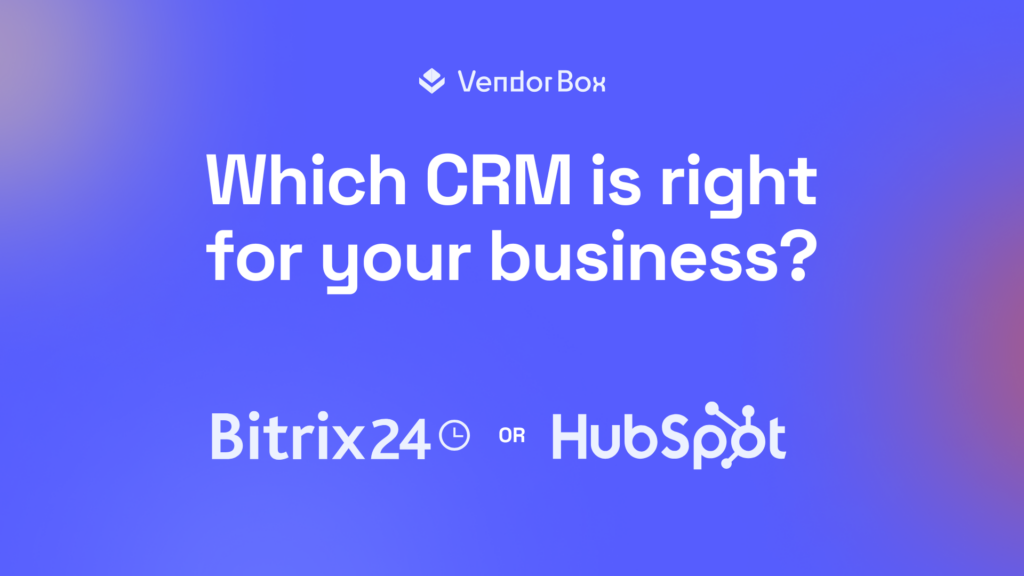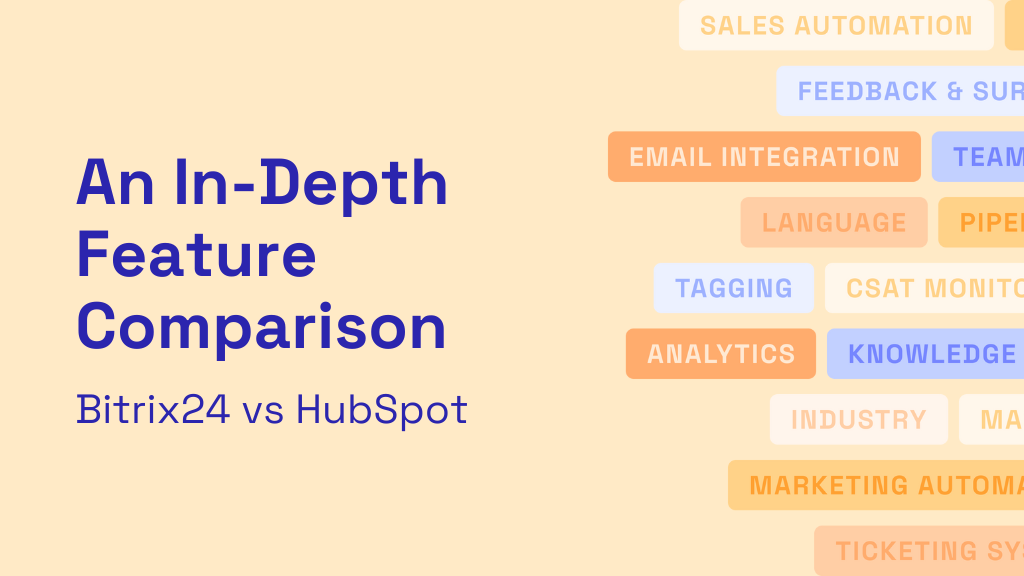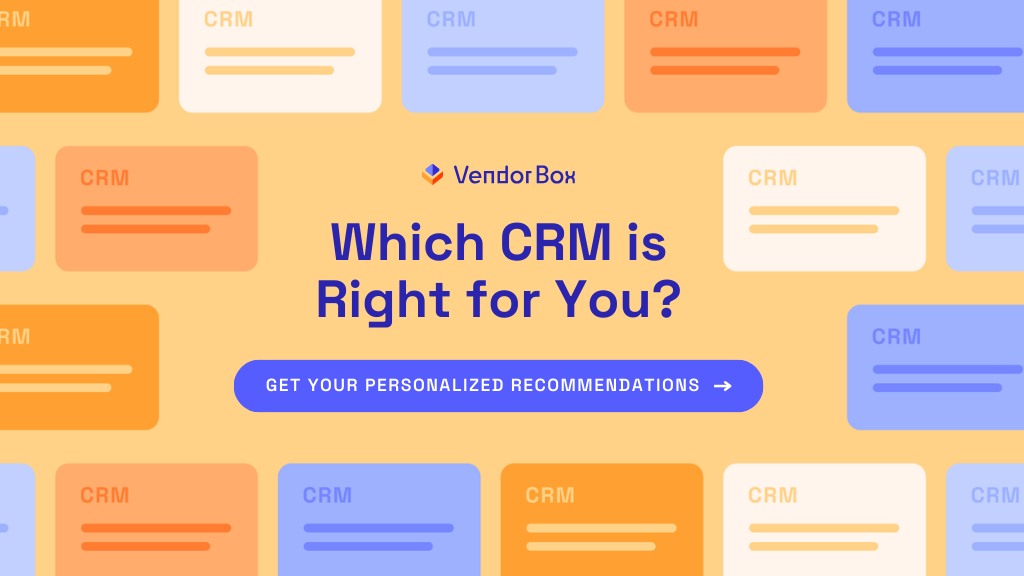
Choosing the right Customer Relationship Management (CRM) platform is a critical decision that can directly impact your business’s growth, efficiency, and bottom line. With the right CRM, businesses can streamline operations, nurture customer relationships, and scale more effectively, but with so many options available, finding the perfect fit can feel overwhelming. Find out if Bitrix24 vs HubSpot is the right fit for your business in this in-depth comparison.
Two of the most popular CRM solutions on the market today are Bitrix24 and HubSpot. While both offer robust tools to manage sales, marketing, and customer service, they are built with different types of businesses and priorities in mind. Understanding these differences is essential to ensure you’re investing in a platform that truly supports your goals.
In this post, we’ll dive deep into the Bitrix24 vs HubSpot CRM comparison. We’ll provide a detailed side by side review to help you make an informed, confident decision for your business. You’ll discover the pros and cons of each platform, explore how they perform in team applications, review pricing structures, examine integration capabilities, evaluate analytics and reporting features, and consider insights from real user reviews. Whether you’re a small business owner, a startup founder, or part of a growing enterprise, this comparison will give you the clarity you need to choose the CRM that best aligns with your needs.
The Face-Off Begins: A Quick Introduction to Bitrix24 and HubSpot
When considering Hubspot vs Bitrix24 for your CRM needs, it’s important to start with a clear understanding of each platform’s roots and strengths.
Bitrix24 was launched in 2012 by Bitrix24, Inc., and is designed as a comprehensive business management solution. It targets small to midsize businesses that need not just CRM, but also project management, communication tools, HR management, and more — all in one platform. Bitrix24 is particularly known for its all-in-one suite approach, offering a vast array of tools at a competitive price point.
HubSpot CRM, on the other hand, emerged in 2014 as part of HubSpot’s broader marketing software suite. It’s primarily focused on helping businesses grow through better customer relationships, with a clean, intuitive interface. These features make it a favorite for marketing, sales, and service teams. HubSpot is celebrated for its user-friendliness, powerful marketing automation features, and robust ecosystem of integrations.
Understanding these core differences is crucial for any Bitrix24 vs HubSpot comparison.
At a Glance: Bitrix24 vs HubSpot Comparison

When it comes to choosing between Bitrix24 and HubSpot, it’s important to weigh both the advantages and limitations of each platform to determine which one aligns best with your business needs.
Bitrix24 Highlights
Comprehensive Platform:
Bitrix24 stands out for being an all-in-one platform that combines CRM, project management, internal communications, and even HR tools. This makes it a great choice for businesses that want everything in one place, streamlining their workflow and reducing the need for multiple separate tools.
Affordable Pricing:
Another major selling point for Bitrix24 is its affordability. It offers a robust free plan that’s especially appealing for smaller businesses and startups. Even as you upgrade to paid plans, the costs remain budget-friendly compared to many other CRM solutions out there.
Collaboration Focus:
Bitrix24’s built-in collaboration tools—like task management, chat, video calls, and document sharing—make it a strong contender for teams that need to work closely together. If internal communication and teamwork are key to your operations, Bitrix24 integrates these tools seamlessly into its CRM.
Things to Consider With Bitrix24
Learning Curve:
However, with all those features comes complexity. Bitrix24 can be overwhelming for new users, especially those unfamiliar with its extensive feature set. The steep learning curve can be a challenge if you’re looking for something quick and easy to set up.
Overwhelming Interface (at first):
Another drawback is its interface. With so many functions packed into one platform, the design can sometimes feel a bit overwhelming as it’s not the most intuitive, especially when compared to more streamlined CRMs. As you become more comfortable with the tool, this feeling fades, but out of the gate, it may make it less appealing for teams who prioritize simplicity.
Primarily Self-Service Customer Support:
Support can also be a bit limited, with much of the help coming in the form of FAQs, forums, and self-help resources. If you need immediate assistance, the lack of live support options can be frustrating.
HubSpot CRM Highlights
User-Friendly Interface:
HubSpot’s biggest strength is its clean, user-friendly interface. It’s modern and intuitive, making it easy for teams to jump right in without extensive training. This is especially helpful for businesses that need a CRM system that’s quick to adopt.
Powerful Tools:
In addition to being easy to use, HubSpot packs a punch with powerful marketing automation, email tracking, lead nurturing, and robust sales pipeline management. Whether you’re trying to nurture leads or keep track of your sales process, HubSpot’s tools are built to help you close deals faster.
Robust Free Plan:
HubSpot also offers an impressive free plan that includes a wide range of CRM features. This is ideal for startups and small businesses that need essential CRM functionalities without having to commit to expensive plans right off the bat.
Things to Consider With HubSpot CRM
Scaling Costs:
The biggest downside to HubSpot is its cost as your business grows. While the free plan is fantastic for small businesses, as you scale and need more advanced features, HubSpot’s pricing can become quite steep. It’s something to consider if you’re planning for long-term growth.
Customization Limits:
Lastly, HubSpot offers fewer customization options compared to more flexible platforms like Bitrix24. If your business needs a CRM that can be molded to your exact specifications, HubSpot is designed for simplicity so highly specialized customization may require workarounds.
Which CRM Will Your Team Benefit from More: Bitrix24 vs HubSpot?

When choosing between Bitrix24 vs HubSpot, it’s important to think about how your team works day-to-day — and what you’ll need to grow.
Bitrix24 is a strong fit for teams that depend on internal communication tools like chat, video conferencing, and intranet features. It’s especially appealing for startups and small businesses working with tight budgets, offering an affordable, all-in-one platform that covers not just CRM, but also project management and team collaboration. If you need more than just customer management — like tools to run your internal operations smoothly — Bitrix24 can be a game-changer.
HubSpot CRM, on the other hand, is a natural choice for marketing and sales teams focused on inbound strategies, lead nurturing, and customer engagement. If your company values ease of use and fast onboarding, HubSpot’s intuitive design and extensive support resources make it a standout. Plus, if content marketing and email campaigns are central to your growth strategy, HubSpot’s marketing tools integrate seamlessly with the CRM to help you scale more efficiently.
What You Need to Know About HubSpot vs Bitrix Pricing
When it comes to comparing HubSpot and Bitrix24 on pricing, the differences are significant.
Bitrix24 Pricing:
- Free Plan: Includes CRM, basic task management, and collaboration tools for unlimited users.
- Paid Plans: Start around $61/month (for small teams) and scale based on user numbers and feature access.
- Key Features in Paid Plans: Advanced automation, expanded storage, sales intelligence, and custom business processes.
HubSpot Pricing:
- Free Plan: Strong CRM core, including deal tracking, contact management, and email templates.
- Paid Tiers:
- Starter ($20/month per user),
- Professional ($500+/month depending on features),
- Enterprise ($1,200+/month).
Cost Considerations: While the free CRM is excellent, businesses often need to upgrade for marketing automation, advanced reporting, and customer service tools.
Choosing the Right Plan:
- Small businesses and budget-conscious startups will likely find Bitrix24’s pricing more sustainable.
- Growth-focused companies seeking scalable marketing and sales solutions may find HubSpot’s investment worthwhile despite the higher costs.
Integrations for Bitrix24 vs HubSpot
Both HubSpot and Bitrix24 bring a lot to the table when it comes to integrations — but they take slightly different routes to get there.
HubSpot CRM: Seamless SaaS Integrations Made Simple
HubSpot makes it incredibly easy to connect with the tools your team is already using. It integrates seamlessly with Google Workspace, Salesforce, Zoom, Mailchimp, Slack, Shopify, and hundreds of other popular platforms. The HubSpot App Marketplace is easy to use and packed with tons of options, so adding new apps to your workflow is hassle-free. If your business is already built around a modern SaaS stack and you’re looking for smooth, reliable integrations, HubSpot will feel like a natural extension — not a tech headache.
Bitrix24: Internal Tools Plus Customizable Connections:
Bitrix24 takes a slightly different approach by offering deep internal integration with its own suite of communication, project management, and collaboration tools. It also supports third-party integrations with platforms like Microsoft 365, Google Workspace, Dropbox, and major social media networks. Plus, if you need something more customized, Bitrix24’s open API makes it possible to build out specific integrations tailored to your needs.
Bitrix24 vs HubSpot’s Reporting & Analytics Features
After making sure your tools connect well, the next big question is: how easily can you turn your data into action? Here’s how HubSpot and Bitrix24 stack up when it comes to reporting and analytics.
Bitrix24: Total Flexibility for Data-Driven Teams
Bitrix24 delivers highly customizable reporting options across sales, project management, and team activities. You can build your own dashboards, create detailed KPI reports, and tailor data visualization exactly the way you want it. This level of flexibility makes Bitrix24 a strong choice for businesses that need granular control over how they track performance, spot trends, and drive smarter decisions.
HubSpot CRM: Pre-Built Power for Growing Businesses
HubSpot CRM takes a slightly different approach, offering a library of pre-built reporting templates designed for marketing campaigns, sales funnels, and customer success tracking. It’s built to provide deep insights into every stage of the marketing and sales pipeline without requiring heavy customization. For businesses that prioritize real-time lead tracking, marketing ROI analysis, and full customer journey mapping, HubSpot’s reporting tools offer a major head start right out of the box. You can also build your own reports and dashboards as well.
We do not currently use HubSpot here at Vendor Box, but our marketing team can attest to how powerful the lead tracking and reporting is, giving you insights into every touchpoint for your customers, leading up to the conversion, down to the exact channel or ad they may have clicked to discover your business.
Bitrix24 vs HubSpot: Customer Support & User Experience
Bitrix24 Support:
- Relies heavily on help articles, online webinars, and a community forum.
- Direct support options are limited, especially for free users.
HubSpot Support:
- Offers live chat, email, and phone support — but mainly for paid plans.
- Extensive HubSpot Academy training courses are available for free, helping users maximize the platform’s features.
User Experience for Bitrix24 vs HubSpot:
- HubSpot: Frequently praised for its clean, intuitive user interface and minimal learning curve.
- Bitrix24: Powerful, but users report that the crowded interface requires more time and training to navigate effectively.
Bitrix24 vs HubSpot Reviews Through the Eyes of Everyday Users
HubSpot users rave about how easy it is to get started, the powerful marketing features, and the active, supportive community that supports the CRM. That said, as businesses scale, some users struggle with the rising costs and wish there was a bit more flexibility for deeper customization.
Bitrix24 users highly value its vast number of features, excellent price point, and team collaboration tools. The most common drawbacks users note are the complexity of the interface and limitations for getting real-time support when you hit a roadblock.
Overall, user reviews reflect that choosing between these two CRMs largely depends on your priorities as a company, tech savviness amongst your team, and the size of your company.
Bitrix24 vs HubSpot: Which CRM is Right for Your Business?
Choosing between Hubspot vs Bitrix24 ultimately depends on what your business values most.
If your priority is an affordable, all-in-one platform that combines CRM features with your project management and collaboration tools, Bitrix24 is a strong contender — especially for startups and budget-conscious teams.
However, if you need a highly intuitive, marketing and sales-focused CRM that can scale with your growth, HubSpot CRM is likely the better fit, despite the higher long-term costs.
No matter which you lean toward, the most important step is choosing a CRM that aligns with your overall business goals, team structure, and existing tech stack.
Tired of juggling leads and losing deals? It’s time for a CRM that works for you.
Vendor Box makes it easy to compare top CRM solutions tailored to your specific needs. Save time, reduce guesswork, and make the best choice for your team — find your CRM match with Vendor Box today!



